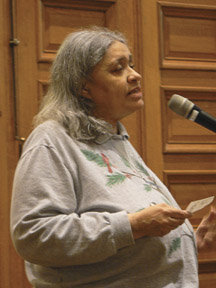Activist and taxpayer advocate Yvonne Balcer recently questioned the wisdom of handing out tax abatement agreements after the City Council approved several ordinances granting the deals to affordable housing developments and senior housing complexes. Two similar ordinances were introduced at the Aug. 10 City Council meeting.
Beginning in the 1970s, the city used payments in lieu of taxes (PILOTs), otherwise known as tax abatement agreements, to entice developers to build in neighborhoods that were in need of urban renewal. Sometimes, the developers ended up paying almost as much as in regular taxes, but was for a pre-determined amount so that the developers would not be subject to fluctuations each year. Other times, developers received major exemptions.
The tax exemptions are in areas of the city that have seen little new development.
____________
Abatement agreements are allowed by state law. In Hudson County, developers that receive them still pay a nominal fee to the county.
Originally, abatements were used to lure developers to high-crime areas and blighted sections of the city that had been abandoned by business and commerce. But Jersey City granted abatements to many waterfront developments well into the 1990s and 2000s, spurring more controversy.
‘The cost of government’
The tax exemptions introduced or approved on Aug. 10 are all in areas of the city that have seen little new development in recent years.
The council approved a 30-year tax exemption for an affordable housing project that will be built by Glennview Townhouse II Urban Renewal Assoc., LP at 296 Woodward St. and 511 Grand St.
Another ordinance granted a 30-year tax exemption for a low and moderate income senior development planned for 561 Montgomery St. that will be built by Montgomery Senior Living Center Urban Renewal Assoc., LP.
A third tax exemption, also for 30 years, was granted to a senior development at 372 Montgomery St. and 193/195 Mercer St. that’s being built by St. Bridget’s Senior Residence Urban Renewal, LLC.
Other ordinances were introduced that, if passed, will give 30-year abates to two other similar developments.
Balcer, a longtime downtown homeowner who has been vocal in her opposition to abatements and other tax matters, told the council the city can’t afford such developments.
“Jersey City pays $104 million to the Board of Education. In 2005, we paid $72 million. No [abated properties] pay Board of Education taxes,” she said at the Aug. 10 meeting.
She added, “There are approximately 32,000 students in the school system. The Police Department, taxpayers spend $200 million [there]. The cost of government is pushing out older residents like myself who are paying for the services of newer residents.”
Balcer later told the Reporter that the city’s tax base is too small to sustain its growing need for municipal services, which puts undue strain on property owners who pay the full tax rate.
‘They pay taxes’
“Affordable housing is very near and dear to my heart. I grew up in public housing. I attended Jersey City Public Schools. Is it fair that Jersey City taxpayers paid for my education?” asked Councilwoman-at-Large Kalimah Ahmad, who is now a practicing attorney, at the meeting. “I don’t know.”
Councilman David Donnelly, who represents the city’s Ward B, bristled at the notion that abated properties don’t pay any taxes.
“It’s not true that they don’t pay any taxes,” said Donnelly. “I was just talking to a woman from Harriet Tubman Homes. That’s affordable housing. They pay property taxes. It’s not fair when people say they don’t pay anything. They’re not giving those people in affordable housing enough credit.”
The Harriet Tubman Homes in Bergen Hill are among several affordable housing condo developments for residents with modest incomes. For example, the Glennview Townhouses II project – which will include 56 units of affordable housing and eight market rate units – will pay the city an estimated $56,754 in property taxes annually. In addition, the developer will pay the city $2,838 for county taxes and an annual service charge of $1,135.
The proposed Montgomery Street project will reconfigure an existing building and turn it into a 68-unit senior housing development with two-bedroom apartments. This developer of this project will pay the city about $32,254 annual in property taxes, on top of another $1,613 for county taxes and a $646 annual service fee.
The developers of these housing complexes won’t pay school taxes or regular county taxes.
“Some of these sites are currently public housing and the city isn’t receiving any property taxes from them at all,” Ahmad pointed out after the meeting. “These developers are coming in and creating affordable housing and now the city will be able to collect some taxes from these sites. These projects are actually putting these properties back on the tax rolls.”
This isn’t the first time Balcer has raised concerns over tax exemptions given to low-income and senior housing. In May she had a testy exchange with Councilwoman Ahmad after the city council approved an abatement for a development on Pacific Avenue, near Liberty State Park.
E-mail E. Assata Wright at awright@hudsonreporter.com.
